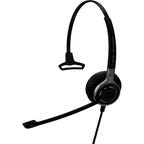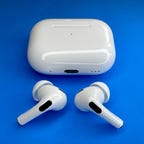
Every laptop has a built-in mic but it’s not good enough for regular formal video calls. And a poor mic can make Zoom meetings particularly frustrating. Your co-workers will likely ask you to repeat what you said, or you might have to go to a quieter space if you want to be heard. If you’re already upgrading your online meetings with one of the best webcams on our list, you might want to consider boosting your audio, too.
Whether you’re fully remote or working in a hybrid role, you know how important Zoom is in maintaining clear lines of communication with your coworkers. A good microphone can help you accomplish that. Here at CNET, we’ve been working in a hybrid model since before the pandemic, so we’ve got our favorite microphones already in the bag. Here are some of the microphones we use every day when on Zoom calls.
Show less
I’ve tried all kinds of Bluetooth single-sided headsets with boom microphones and none of them sound very good. Corded headsets really excel for Zoom, and how far do you really need to walk away from a video call anyway? The Sennheiser SC635 is a premium corded headset available in either 1/8-inch plug or USB versions — I use the former for the best audio quality. Skip the wireless earbuds, they put microphones on the sides of your head, too far from the hole where the words come from.
— Brian Cooley
Photo Gallery 1/1
Senheiser
Show expert take Show less
Show less
Not only do I spend more hours than ever before on Zoom but I spend a lot of time podcasting so I needed a mic that sounded good and would continue to do so all the time. The Stage Right bundle from Monoprice comes with everything I needed to get set up quickly with a great-sounding mic, over-ear monitors, a mechanical arm and a decent pop guard.
It’s not the greatest mic I’ve ever used — it can sometimes pick up outside noise — but it is an excellent bundle at a price that’s hard to beat.
— James Bricknell
Photo Gallery 1/1
James Bricknell / CNET
Show expert take Show less
Show less
Not all conference calls involve sitting down in front of a laptop. Sometimes you’re the person giving a presentation and you need a little freedom of movement. A Lavalier mic connects to your collar and wirelessly streams to a small control unit attached to your laptop.
The Lark Max comes with two mics, with noise cancellation and a controller unit that’ll easily connect to your iPhone, Android or laptop (via USB-C). The sound quality is excellent, though you’ll need to speak a little louder than with a desk mic. The drop in volume is well worth it to have the freedom of movement and the sound quality you get from the Lark Max. As an added bonus, the case also charges the mics and controller so you’ll have them ready to go when you need them.
Photo Gallery 1/1
James Bricknell / CNET
Show expert take Show less
Show less
I’ve been using my Blue Yeti microphone for quite a while now and have loved every second of it. Mine sits on a no-name arm that I picked up from Amazon as I was reorganizing my desk, and that’s actually made it even more useful for me. There’s a volume knob and mute button on the front of it so I can easily mute myself on a call without reaching for a software feature on my Mac.
The quality has been great and it’s never given me an issue. I wish that it used USB-C instead of Micro-USB, but since it’s something I leave plugged in all the time and don’t really fuss with, I’m not overly worried about that.
— Jared DiPane
Photo Gallery 1/1
Blue
Show expert take Show less
Show less
While not specifically a microphone, the AirPods by Apple is a great way to take Zoom calls. I normally have a giant microphone in front of my face for large meetings, but when you’re having a small meeting that’s more personal, a set of AirPods is more than enough. Most people already have a set of AirPods if they own an Apple phone, so why spend extra money if you don’t have to?
— James Bricknell
Show expert take Show less
Show less
I wish I used my Yeti Blue microphone more, but my Razer Kiyo webcam has been my workhorse mic throughout the pandemic. That’s mostly because the Blue is too good, picking up clacky keystrokes from where it sits over my mechanical keyboard, while the Kiyo just gets my voice from its perch above my monitor.
That’s not a dig at the Kiyo itself, which is better than internal microphones and most headphones. It’s a convenient all-in-one, and, given how annoying it is to switch between microphones on the half-dozen video chat platforms I use, it’s nice to have a reliable mic always plugged in and ready.
— David Lumb
Photo Gallery 1/1
Razer
Show expert take Show less
Show less
I need one mic for Zoom calls, for podcasting, for presenting videos and for doing voice-over work and the beautiful audio quality of the Shure MV7 provides all of that. But unlike a lot of professional condenser mics, it connects via USB straight into my computer so I don’t have to mess about with audio interfaces or any of that nonsense. It’s totally just plug-and-play, making it simple to get professional-quality recordings.
— Andrew Lanxon
Photo Gallery 1/1
Shure
Show expert take Show less
Show less
This is my go-to mic for just about everything. I use it for Zoom calls, I use it for remotely beaming into TV stations around the country and I use it for recording any CNET videos I shoot myself.
I like it because it’s a shotgun mic, which is my preference over a lav mic in general. It’s compact and can work in just about any space. And it sounds decent for a $50 mic. I’ve used Rode mics for years in other capacities and trust the brand.
Right now, I have it in a tiny shock mount, attached to a clamp. That way, it can clamp into my tripod, or I can use the wedge-shaped clamp as an adjustable desktop stand. When recording into an iPhone, I just add an audio-to-Lightning cable and it’s good to go. Otherwise, I connect with 1/8-inch audio cable to a laptop or desktop PC.
— Dan Ackerman
Photo Gallery 1/1
Dan Ackerman / CNET
Show expert take Show less



